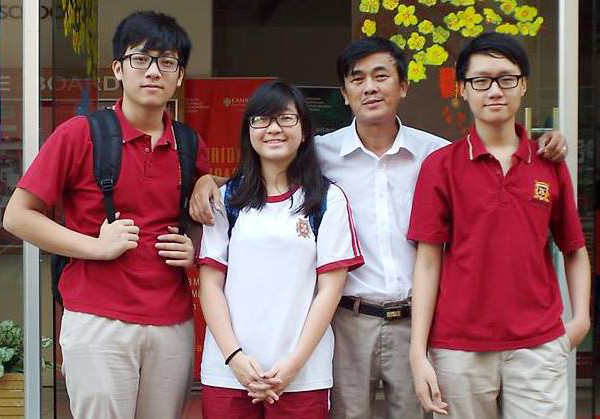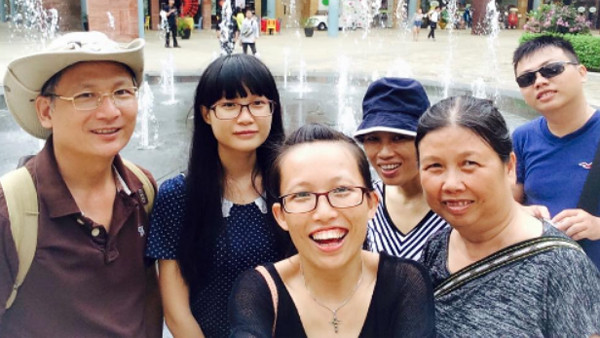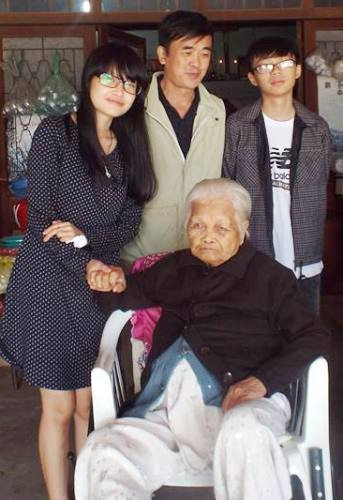The principal and 7 family members registered to donate organs.
With the concept of "It is more blessed to give than to receive", Mr. Thinh and his siblings and children signed up to donate all their organs.
Master Pham Phuc Thinh is currently the principal of an international school system in Ho Chi Minh City. Sharing about his decision to donate organs, the 54-year-old teacher said that 7 years ago, while the whole family was having dinner, they happened to watch a program on TV to honor organ donors who saved the lives of patients. At that moment, the whole family, from adults to children, began to discuss enthusiastically and came to the decision to donate their organs after death.
|
Teacher Pham Phuc Thinh (second from right) with his students. Photo:TT. |
"Since childhood, our parents have taught us that we must give without expecting anything in return. We are lucky to have bright eyes and a healthy heart. After we die, we will no longer be able to use these blessings, so why not share them with those less fortunate?", Mr. Thinh shared.
After dinner that night, all 10 members of Mr. Thinh's family agreed to register to donate organs at Cho Ray Hospital. After that, the whole family carefully researched the conditions for organ donation, but only 8 people met the criteria, and Mr. Thinh's two older siblings were both over the age limit (over 60 years old).
Mr. Thinh shared his intention to donate organs with his mother, and she was very supportive. Having suffered the pain of losing her husband to leukemia without being able to find a bone marrow donor, the 80-year-old woman understood very well the importance and noble meaning of what her children and grandchildren were about to do.
|
Mr. Thinh's siblings and children all registered to donate organs. Photo:TT. |
The biggest challenge for Mr. Thinh was convincing his wife. His wife believed that "one must die with the body intact" to be reincarnated, so she did not support her husband and children giving away any body parts. Mr. Thinh spent a day explaining his wishes to his wife.
"When people die, they cannot take anything with them to the other world. If they know that their heart or kidney is being used by someone, it means that their loved ones still exist, and life continues. There is nothing happier than that," said Mr. Thinh. The teacher's sentiment moved his wife, who nodded in support of her husband's decision.
Mr. Thinh has two children, a boy and a girl, who are all eager to go with their father to register for organ donation. The three of them agreed to choose a day to go to Cho Ray Hospital to complete the registration procedure. At the Human Organ Transplant Coordination Unit, in the registration form, Mr. Thinh and his children all ticked 10 boxes corresponding to 10 body parts that would be donated after death.
|
Mr. Thinh's son and daughter also registered to donate organs. Photo:TT. |
Since the day he registered to donate organs, Mr. Thinh has always told his children to carry the card with them along with their ID cards and other important personal documents. "In case of an unfortunate life-threatening incident, this card will help the emergency unit identify the person who registered to donate organs. They will notify the Human Organ Transplant Coordination Unit to receive, preserve the body and proceed to take the organs for transplant to the patient as soon as possible," the teacher shared.
Mr. Thinh's daughter, Pham Nguyen Nhu Minh, 22 years old, a fourth year student in the Faculty of Pharmacy at Nguyen Tat Thanh University, is very proud of the organ donation registration card bearing her name. Every now and then, she shows it off to everyone and says it is "a rare commodity that not everyone has". Mr. Thinh also teaches his children to be aware of healthy eating, not to smoke or drink alcohol, and to increase physical exercise to maintain health. This habit is not only good for oneself but also a must-do to keep body parts in a healthy state before donating them to others.
Mr. Thinh also called on some friends and colleagues to donate organs as a noble gesture. The principal confided: "I believe that if everyone knows how to share and give without expecting anything in return, social morality will be better. The more people donate organs, the more patients will be saved. That way, our deaths will not be the end."




